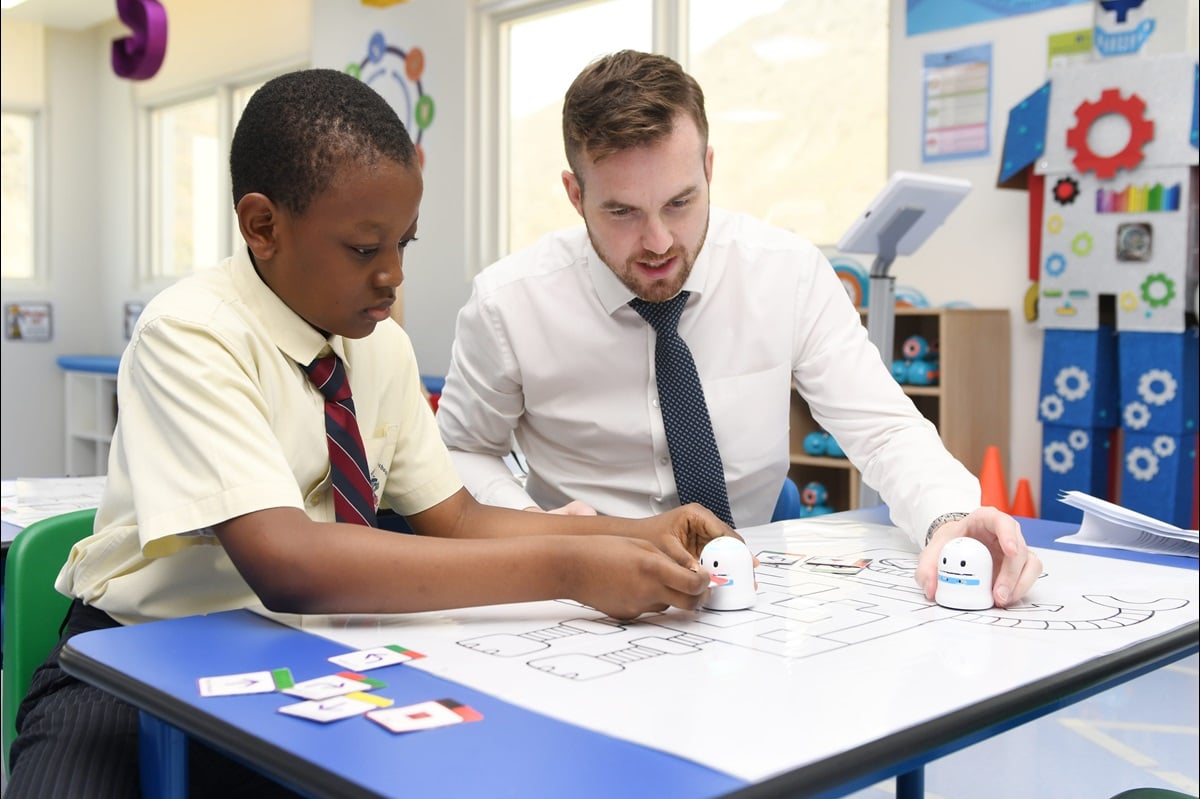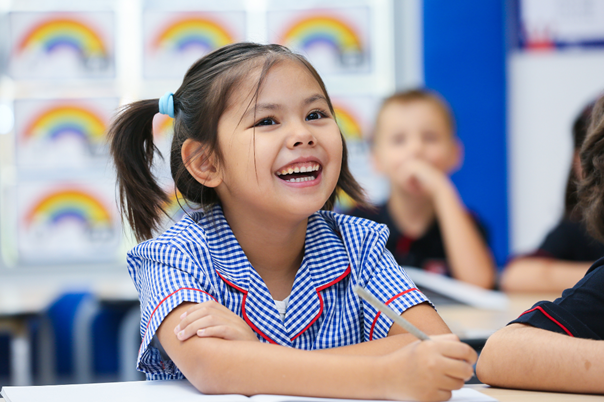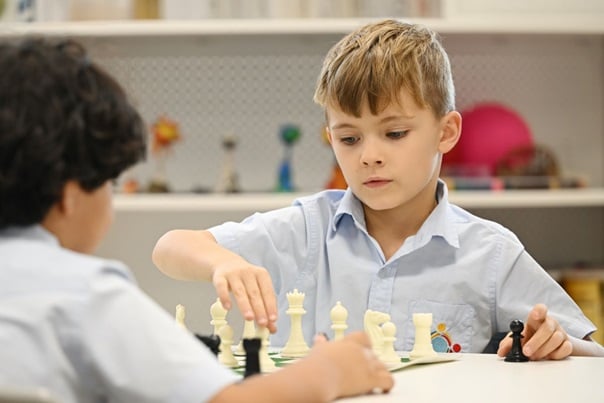Every child is unique, and children learn in different ways, have different skills, and are interested in different things. When a child’s education is tailored to their interests, talents and learning style, learning is easier, more fun and progress is inevitable.
Indeed, all children can achieve what they set their mind to, become academically successful, and enjoy a life full of opportunities in school and beyond. Our role, as adults, is to empower them through personalised learning.

Teacher-Centred vs. Learner-Centred Education
Personalised learning is a learner-centred learning approach, the direct opposite of teacher-centred education, and it is what we use and implement at GEMS Education.
Teacher-Centred Education
In teacher-centred education, the teacher:
- stands at the centre of conventional education
- is the sole authority in the classroom
- broadcasts information that the children copy down and try to memorise so they can pass quizzes and exams
- controls the flow of information, typically based on general group progress or the capacity of the majority of the children in the class
In teacher-centred education, the children are passive receivers of information. There’s also no regard for the individual interests and capacities of learners.
Learner-Centred Education
In learner-centred education, the teacher steps aside, and the child takes centre stage. The child:
- sets the pace
- decides what and how they want to learn
- takes charge of their learning
As the child strives, they naturally and inevitably pick up the knowledge, skills and behaviours they must learn to advance.
In learner-centred education, the children are active agents of and participants in learning. The teacher presents the materials to the child in a way that appeals to the child’s interests and fits the child’s learning style.
In the process, the child learns and studies, not because they must but because they want to, and they remain curious, a lifelong learner who strives to learn more.
The Science of Learning
We hold everything we know in our long-term memory and retrieve information as and when needed. For efficiency and ease of retrieval, knowledge must be organised in a certain way.
How information is organised and stored in our long-term memories is a function of our working memory, the gateway to our long-term memory. It’s where we form and hold concepts before we commit them to our long-term memory.
The process by which the working memory interfaces with the long-term memory is involved and complex, but here are the essential points:
- The working memory's capacity is limited, so it can hold only a finite amount of information at a time.
- The working memory has a limited time capacity, so the information it contains is likely to fade unless it’s refreshed and reviewed.
- The working memory can use information stored in the long-term memory to make sense of new information.
- Working memory abilities vary from person to person and may change across their lifetime.
Applying the Science: The Personalised Learning Approach
The science about how we learn informs how we teach our children at GEMS. Using the above points as guidelines, we:
- deliver new information in small steps and in an organised manner to avoid over-burdening their working memories
- provide them with opportunities to review information to slow down concept decay and to make it easy to connect pieces of information into a sensible whole
- give them opportunities to practise so they can commit new knowledge to their long-term memory
- encourage them to practise independently so they can become more efficient at retrieving information from their long-term memory
However, the most important realisation is that learning is personal. Since working memory abilities vary from person to person, the method of teaching must be adjusted accordingly.
We can train our children to expand the capacity of their working memories. However, adapting lessons and materials to children’s working memory abilities is a better strategy.
In other words, when teaching a child, we must:
- organise the information so it makes sense to them
- make the information interesting and relevant to them
- deliver the information in a way that fits their learning style
Teachers must do this for every child in their care. This is why personalised learning requires skilled teachers.
Personalised learning can help children realise their full learning potential and achieve academic success.

Our Personalised Learning Approach at GEMS Schools
The following are the hallmarks of personalised learning at GEMS:
1. Student and Parent Voice
We consider the student voice by conducting cohort and school surveys, and listening to the student council. We also conduct parent surveys and have active parent councils that provide input and feedback, helping us to constantly improve our offering.
2. Individual Needs
Our teachers consider individual needs. At GEMS Wellington Academy, for instance, the teachers use a graduated approach and tailor the support they provide to students according to learners’ individual needs.
3. Skilled Teaching
Personalised learning training is standard at GEMS.
We train our teachers in personalised learning approaches and strategies. This enables them to help children make meaningful connections between the educational materials and lessons and real life, ensuring learning remains relevant.
4. Well-Structured Lessons
Our lessons are well-structured and organised, so your children can go through them at their own pace and start at any point, as their learning level dictates.
5. Data Capture, Tracking and Monitoring
We systematically collect, analyse and track our students’ learning performance and progress to ensure they attain their learning goals. Our teachers and school staff use the data to guide your children in choosing an appropriate pathway.
School administrators also have rigorous and systematic evaluation, assessment and review systems. These give them a realistic and detailed view of the school’s own progress.
6. Relationships Among Teachers and Students
Our schools encourage open communication, so children are not afraid of committing mistakes and more open to discussing challenges. Consequently, our teachers can provide personalised guidance and support.
7. Pathways
We can provide children with various learning options.
Our British curriculum schools in Dubai and Abu Dhabi provide several general certificate of secondary education (GCSE) options in Year 9. Students choose the subjects that best suit their interests, academic development and future career aspirations.
Our International Baccalaureate (IB) schools also allow for path customisation. At GEMS Al Khail, for instance, you can choose between the IB diploma programme (IBDP) and the IB career-related programme (IBCP).
We understand that our students’ mother tongue influences their learning. At GEMS World Academy Dubai, we are committed to inclusivity and offer the following mother tongue languages:
- Arabic
- Mandarin
- Russian
- Spanish
- French
- Italian
- Swedish
- Hindi
- German
- Turkish
- Korean
- Dutch
- Danish
- Portuguese
- Hebrew
- Farsi
8. Adaptive Learning Technologies
We use digital tools and resources to enhance personalisation. Using adaptive learning technology platforms, children can explore topics and focus on their interests while teachers and parents monitor their activity and engagement.
Our teachers can use the data captured by adaptive learning technology platforms to hone their approach and further accommodate your children’s particular interests.
Personalised Learning Empowers
Personalised learning is taking a child'’ needs and interests and customising lessons, materials and instruction accordingly. Personalised learning empowers children, turning them into lifelong learners and ensuring successful outcomes in school and beyond.
GEMS believes in and practices personalised learning.
View the list of GEMS schools in the UAE and contact the GEMS Education admissions team for any questions you may have.
More Popular Blogs
-
Do you need guidance on how to choose the right school in the UAE for your children? Expatriate parents, read on to learn more.Read More
-
If your child is eight years old now, in what grade will they be when they transfer to a school in the UAE? This school age guide in the UAE will help you answer this and similar questions.Read More
-
Every child is unique, and children learn in different ways, have different skills, and are interested in different things.Read More









